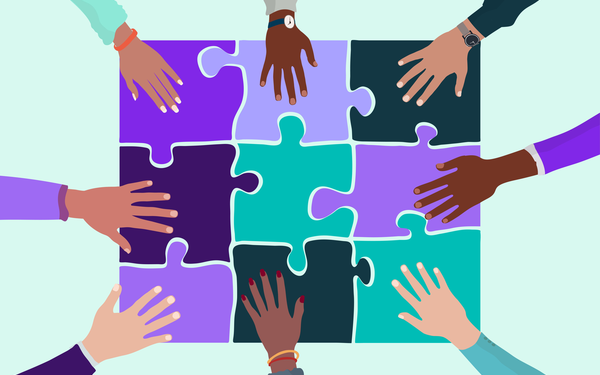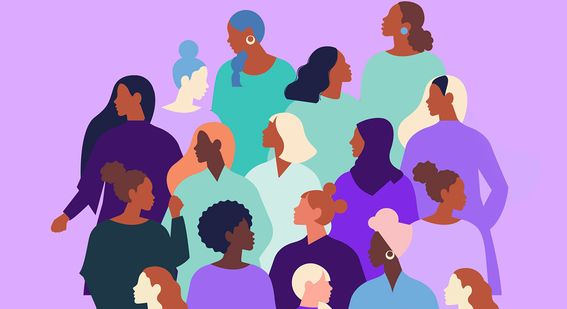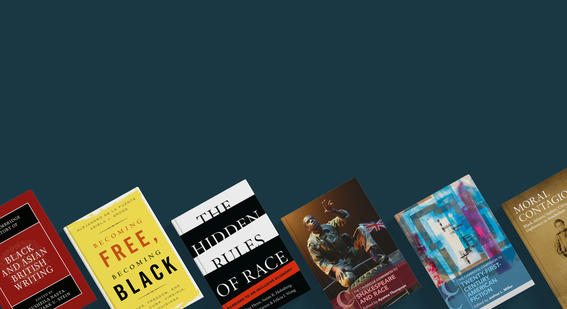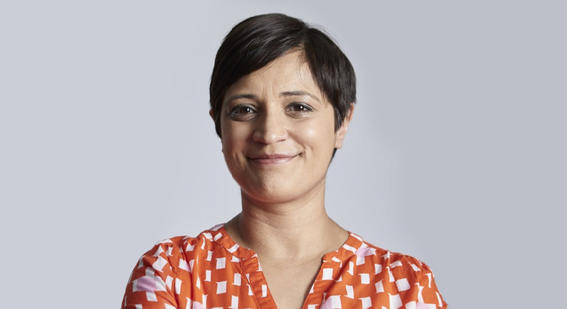Building a place to belong at Cambridge
Co-chairs of our Racial Equality and Ethnicity Balance staff network discuss Black History Month and working towards an environment where all colleagues feel a sense of belonging.

At Cambridge University Press & Assessment, we believe that by sharing ideas, influencing change and building a sense of belonging, we can be a place where every individual can experience the fullness of their potential.
We have been marking Black History Month, which takes place in the UK every October. It is an opportunity to highlight the history and achievements of Black people, as well as being a time to encourage important conversations about race and equality.
Two of our inspiring colleagues who are reaching further to create an equitable and connected global community at Cambridge are Agnes Xia-Hu, a Senior Business Development Representative based in our New York office, and Melissa Scott, a Programme Manager based in our Cambridge headquarters.
Agnes and Melissa are co-chairs of our Racial Equality and Ethnicity Balance staff network and have shared some insight into the work of the network and discuss the importance of celebrating Black history.
Our staff networks offer an important space for employees to learn about diversity and celebrate the moments that create a sense of belonging for them.
- Serita Bonsignore, Global Director of Equality, Diversity, Inclusion and Belonging
What does Black History Month mean to you?
I consider Black History Month the time when we can collectively reflect and learn from the history – so that we can have a better understanding of the current racial inequalities and be part of the change.
Melissa: As a Black British woman, Black History Month is a time of celebration. It is an opportunity to acknowledge the contributions, sacrifices, and achievements of Black people. I see it as a time to pay homage to Black people who have greatly impacted our nation, to celebrate our past, present and future. It is not only about our struggles and oppression, but also an opportunity to learn more about the brilliant historical figures whose contributions continue to benefit the world today.
Agnes: As an immigrant to America of Asian heritage, I consider Black History Month (February in America) the time when we can collectively reflect and learn from the history – so that we can have a better understanding of the current racial inequalities and be part of the change. I think a lot about how I have been able to get an education, employment, and residency thanks to the civil rights movement and affirmative action led by generations of Black Americans.
Being a Cambridge University Press & Assessment employee, I’m pleased to see the University of Cambridge recognising its own past and links with the slave trade in a recent statement and the launching of the Cambridge Legacies of Enslavement Fund. Black History Month is an opportunity to think about how the legacy of slavery and colonialism are still affecting Black communities to this day.
What is the purpose of the Racial Equality and Ethnicity Balance staff network?
Agnes and Melissa: Our mission is to advance diversity across the organisation and beyond. We champion our colleagues of colour. We want colleagues to feel valued and have a sense of belonging at Cambridge University Press & Assessment. We want equal opportunity; we will achieve this through training and development, which will enable more colleagues of colour to progress into management and increase talent retention amongst the ethnic minority community.
In our work, we want to improve diverse representation in the content we produce as an organisation and ensure we have a pool of diverse authors to work with.
We encourage education and open conversations around race in a safe environment so we can actively remove social barriers and start to dismantle systemic racism. We strive to be a network that educates, includes, and inspires.
What made you want to get involved with the network?
...the network is helping our underrepresented colleagues' voices to be heard, as well as encouraging difficult but important conversations.
Agnes: I joined the network as part of the initiative to make our staff networks more global and representative of our employee body. I am consciously aware of the stereotypes often associated with East Asian woman, like myself, in and out of the workplace. From a personal development perspective, being a leader of the network and being outspoken over the issue of race and racial equality are my ways to break the stereotypes. More importantly, I want to foster this environment of inclusion within the network as we talk about race and ethnicity, to make sure it extends beyond the UK and US narratives and reflects the true nature of our global organization.
There is a Chinese phrase, “抛砖引玉,” which translates into “throwing bricks to attract jades”. My goal is to be the “brick” holding the door open for more “jades” of different races, ethnicities, and nationalities to come in, so we can move closer to the goal of an equitable workplace – together.
Melissa: In short, we have so much to learn from different perspectives which is why I want to be a part of the Racial Equality and Ethnicity Balance network. Through a greater sense of community and shared experience, I feel the network is helping our underrepresented colleagues' voices to be heard, as well as encouraging difficult but important conversations. This work has given me the opportunity to collaborate with colleagues across the globe who I might not have crossed paths with otherwise. I feel the creativity and collaboration the network is demonstrating helps drive continuous improvement in the organisation by fostering the diverse and inclusive working environment we all want to be a part of.
How are Cambridge colleagues marking Black History Month in the UK?
Agnes and Melissa: Our staff network will be holding a number of events for colleagues across the globe. This includes running a workshop called ‘What’s in a name’ with Mental Health First Aid England on the power of names and how we use them. We know that many colleagues actively want a better understanding of the impact mispronouncing someone's name can have and this workshop is a great opportunity to learn and raise more awareness.
We will also be co-hosting an event with our colleagues in the Disability and Neurodiversity staff network where we will be watching and discussing Netflix documentary ‘Crip Camp: A Disability Revolution’, highlighting Camp Jened, a summer camp launched in the 1970s and the incredible path of the disability rights movement in the United States.
The first issue of our new Racial Equality and Ethnicity Balance network newsletter comes out this month for staff and will include a feature from our network’s Executive Board sponsor Francesca Woodward.
What ambitions does the network have for the future?
We are fostering an environment that encourages brave and uncomfortable conversations.
Agnes and Melissa: We helped to launch an ‘Anti-Racism Toolkit’ this year for colleagues in the UK and US as part of the organisation’s Anti-Racism Action Plan. The toolkit is intended to guide the conversations we have in order to help make Cambridge the anti-racist organisation we want to be part of. It is a call-to-action to all colleagues, at all levels, to actively engage and bring about positive change. As the Racial Equality and Ethnicity Balance network, we want to encourage and support adaptations of the toolkit in other regional offices too.
We are working on multiple projects to increase our global representation and outreach across the organisation through quarterly network newsletters, the creation of a global important dates calendar, and facilitating regular check-ins for our network members.
We are fostering an environment that encourages brave and uncomfortable conversations.
Francesca Woodward, Managing Director for our English business, who is the Executive Board sponsor for the Racial Equality and Ethnicity Balance network shared her perspective:
“The theme for this UK Black History Month is ‘Action not Words’. I think we all need to consider what actions we need to take both individually and as organisations to make our workplaces more diverse and inclusive. As a starting action in my own team, last month many senior colleagues across English took part in sessions to explore our anti-racism toolkit and discussed their own experiences of privilege and racism. It might only be a small action at this point, but it’s a start.”
Serita Bonsignore, Global Director of Equality, Diversity, Inclusion and Belonging at Cambridge University Press & Assessment, added:
“The work that Melissa and Agnes are leading on through the Racial Equality and Ethnicity Balance network is incredibly important. It reflects the importance of equality, diversity, inclusion and belonging at Cambridge in the values we expect of each other in the workplace, and it's fundamental to our belief that education is a force for good. Our staff networks offer an important space for employees to learn about diversity and celebrate the moments that create a sense of belonging for them.”




